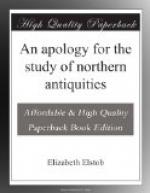and transposing Words either in Prose or Poetical
Compositions, be of any use, towards the rendering
such Compactions sweet, or nervous, or harmonious,
according to the Exigencies of the several sorts of
Stile, one wou’d think
Monosyllables
to be best accommodated to all these Purposes, and
according to the Skill of those who know how to manage
them, to answer all the Ends, either of masculine Force,
or female Tenderness; for being single you have a
Liberty of placing them where, and as you please;
whereas in Words of many Syllables you are more confined,
and must take them as you find them, or be put upon
the cruel necessity of mangling and tearing them asunder.
Mr.
Dryden, it is true, wou’d make us
believe he had a great Aversion to
Monosyllables.
Yet he cannot help making use of them sometimes in
entire Verses, nor conceal his having a sort of Pride,
even where he tells us he was forc’d to do it.
For to have done otherwise would have been a Force
on Nature, which would have been unworthy of so great
a Genius, whose Care it was to study Nature, and to
imitate and copy it to the Life; and it is not improbable,
that there might be somewhat of a latent Delicacy
and Niceness in this Matter, which he chose rather
to dissemble, than to expose, to the indiscreet Management
of meaner Writers. For in the first Line of his
great Work the
Aeneis, every Word is a
Monosyllable;
and tho’ he makes a seeming kind of Apology,
yet he cannot forbear owning a secret Pleasure in what
he had done. “My first Line in the
Aeneis,
says he, is not harsh.
“Arms and the Man I sing,
who forc’d by Fate.
“But a much better Instance may be given from
the last Line of Manilius, made English
by our learned and judicious Mr. Creech;
“Nor could the World have
born so fierce a Flame.
“Where the many liquid Consonants are placed
so artfully, that they give a pleasing Sound to the
Words, tho’ they are all of one Syllable.”
It is plain from these last Words, that the Subject-matter,
Monosyllables, is not so much to be complain’d
of; what is chiefly to be requir’d, is of the
Poet, that he be a good Workman, in forming them aright,
and that he place them artfully: and, however
Mr. Dryden may desire to disguise himself,
yet, as he some where says, Nature will prevail.
For see with how much Passion he has exprest himself
towards these two Verses, in which the Poet has not
been sparing of Monosyllables: “I
am sure, says he, there are few who make Verses, have
observ’d the Sweetness of these two Lines in
Coopers Hill;
“Tho deep, yet clear; tho
gentle, yet not dull;
Strong without Rage, without
o’erflowing full.
“And there are yet fewer that can find the reason
of that Sweetness, I have given it to some of my Friends
in Conversation, and they have allow’d the Criticism
to be just.”




